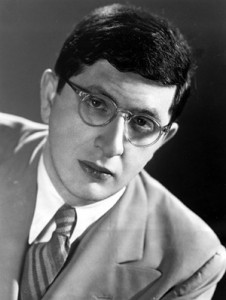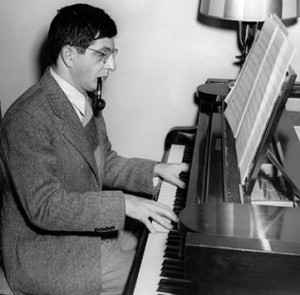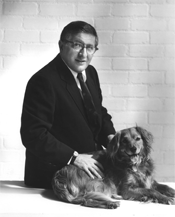
“I believe that only music which springs out of genuine personal emotion is alive and important. I hate all cults, fads and circles. . . . I am not interested in music, or any work of art, that fails to stimulate appreciation of life and, more importantly, pride in life.” —Bernard Herrmann
Even if you’re only vaguely aware of Bernard Herrmann’s life and music, or even if you are an enthusiast and the local authority, or, more challenging, even if you know nothing about the man and his art, you will discover much of interest in Steven C. Smith’s biography of the composer. And, beyond any of this, if you have an interest at all in film music, you should be captivated by the sometimes vivid eccentricity of this life and the can’t-put-down readability of this author’s style.
I apologize for just now reading A Heart at Fire’s Center: The Life and Music of Bernard Herrmann, for it was originally published in 1991 and appeared in paperback for the first time in 2002. As a life-long fan of the composer—second only to Number One, Erich Wolfgang Korngold—this apology is both incomprehensible and insufficient.
And who is this Bernard Herrmann, anyway? Simply put, though there was nothing “simple” about the man, he was one of the most eccentric, rude, angry, impatient, withdrawn, condescending, physically untidy artists who ever lived; at many parties he was an embarrassment, before an orchestra a zealous conductor with an erratic baton technique. He was, in fact, the personification of the longhair, highbrow composer. But there were contradictions, so common in great men, for among film composers he was, indeed, great. He was also kind, humorous, an old-fashioned romantic, the life of (certain) parties, an encyclopedia of knowledge—not limited to music—and a seeker of perfection. As Shirley Steiner, wife of film composer Fred Steiner (TV’s Gunsmoke), recalled:
He wanted perfection—but of course Benny was human, and perfection consisted of what he perceived as perfection. Any trivial mistake, any rationalizations, any dishonesties you had with yourself were blown out of proportion for him; he had no patience for these. . . .Benny . . . moved in wonderful circles, but he picked and chose when he wanted to display his charm, when it was important to him. You could have Benny as a dinner guest with people whom he wanted to be nice to, and he was as great a gentleman as you could find; but it’s incredible how he could put those manners aside when he didn’t want to use them. I think he was an opportunist, like all of us.
For the record, as it contradicts (or does it?) Steiner’s observation, Christopher Palmer, Herrmann scholar and record producer, thought a little differently:
His capacity for friendship was inexhaustible. He was never interested in cultivating people merely for what they might do for him and his music, although he was always deeply appreciative of efforts made on his behalf. . . . He had the ability to draw the best out of you, to make you realize you were capable of more than you thought possible.
His lack of surface polish concealed an immensely cultured mind, one that could be applied to for guidance in matters not only of music . . . but also of literature (he was widely read) and painting (particularly with regard to 19th-century art he had a fine, discriminating taste).
 Benny was a nervous, mercurial chameleon, so maybe both views of his approach to people are true. The color of his moods, the tone of his rhetoric depended upon how he reacted to the circumstances, to the competence of others, even to the weather. He didn’t abide fools, and any one new was routinely suspect until he proved himself, then he was a friend for life—or until he challenged the composer, violated his sacred standards or committed a breach of musical taste, often over the most trivial things.
Benny was a nervous, mercurial chameleon, so maybe both views of his approach to people are true. The color of his moods, the tone of his rhetoric depended upon how he reacted to the circumstances, to the competence of others, even to the weather. He didn’t abide fools, and any one new was routinely suspect until he proved himself, then he was a friend for life—or until he challenged the composer, violated his sacred standards or committed a breach of musical taste, often over the most trivial things.
Bernard Herrmann, born in New York in 1911, came from a household of “clashing extremes,” as author Smith writes. His mother was illiterate, “insecure about money (despite [husband] Abraham’s full-time employment), and a well-read father who rarely saved his earnings; an Orthodox Jewish mother in perpetual argument with a father who would not tolerate religious discussion.” As a family friend remarked, “Benny always said his mother was a peasant and his father a gentleman.” Perhaps these contradictions were the source of Herrmann’s multiple personalities—“duo” perhaps being too restrictive.
His reason for departing the Juilliard School of Music after only two years is unclear. Film composer Jerome Moross (The Big Country) suggested that both he and Benny were “tossed out” because those in authority disliked the modernism of their music. Herrmann insisted he left because of the school’s conservatism, though his second year earned him a D, owing to “too many absences,” away, perhaps, sneaking into rehearsals of the New York Philharmonic, as Moross related.
 It was about this time that Herrmann heard for the first time a live performance of Charles Ives’ music, “Three Places in New England.” He would later champion, and come to know, the composer. He would later come to dislike Leonard Bernstein’s 1958 recording of Ives’ Second Symphony and would record a version of his own in 1972. As an Anglophile, Herrmann’s favorite composers were, not surprisingly, English—Elgar, Vaughan Williams and Delius. Benny, who loved animals, had himself photographed with this dog Twi, in a pose modeled after one of Elgar and his dog.
It was about this time that Herrmann heard for the first time a live performance of Charles Ives’ music, “Three Places in New England.” He would later champion, and come to know, the composer. He would later come to dislike Leonard Bernstein’s 1958 recording of Ives’ Second Symphony and would record a version of his own in 1972. As an Anglophile, Herrmann’s favorite composers were, not surprisingly, English—Elgar, Vaughan Williams and Delius. Benny, who loved animals, had himself photographed with this dog Twi, in a pose modeled after one of Elgar and his dog.
His first musical success began in 1934 with CBS radio, composing and conducting background music for poetic and dramatic presentations. The instrumental groups, always varying in makeup, were small due to space and finances, but Herrmann was able to achieve a far larger sound—and the most amazing effects from the smallest and most diverse ensembles. He became something of a sensation with two programs in particular, “Music in the Modern Manner” and “Exploring Music.” He presented world premieres of modern composers and delighted in unearthing obscure ones, e.g., Joachim Raff, Ditters von Dittersdorf and Luigi Cherubini, even famous individuals not known as composers—Frederick the Great, Samuel Pepys and Henry IV.
Thought the Theramin Paced Dali in the 1948 “Spellbound”?